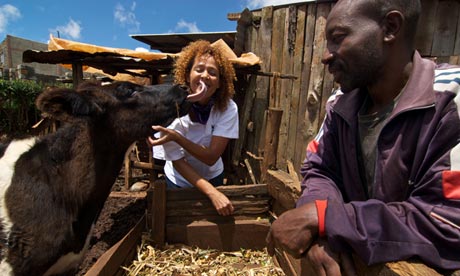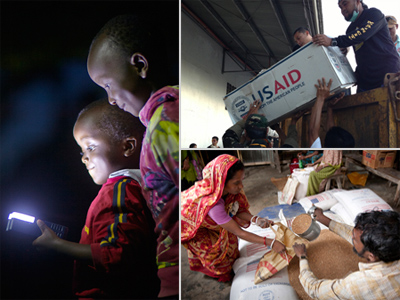Rwanda is on the move. It’s one of the only countries expected to meet the
Millennium Development Goals by 2015, and is already a leader on the continent
in the areas of health care and economic growth. The successes are remarkable,
but in order to be sustainable over the long term, Rwanda’s local institutions
have to be healthy and high-performing.
To help
Rwanda achieve the sustainability it desires, the USAID-funded Human and
Institutional Capacity Development project supports the country's government
institutions and civil society organizations using the internationally
recognized Performance Improvement (PI) approaches to demonstrably
improve performance. The approaches include rigorous assessments of
organizational needs and developing solutions to help organizations create a
strategic vision, strengthen communications and internal systems, and better
prepare for and adapt to challenges and changing circumstances.
Building Sustainable Performance
Improvement Through a Community of Practice
The project
seeks to institutionalize PI approaches within Rwanda’s government and private
sector, and has established a community of practice for professional Rwandan
consultants seeking to incorporate the tools and processes into their work.
Beginning in 2013, the project provided intensive training to 60 consultants
through a series of targeted workshops. It also provides coaching and
mentorship, and offers paid internships to qualified local consultants to use
their new skills and help the project conduct performance analysis.
“The HICD
project represents one of USAID’s core priorities, which is to support public
institutions to operate in an effective and inclusive fashion, and that civil
society is equipped to advocate effectively on behalf of individuals and
communities in Rwanda” said Emily Krunic, Democracy and Governance Office
Director at USAID/Rwanda. “This training and certification of local
organizations will make sure Rwanda has the skills to strengthen its own
organizations into the future.”
Rwanda Poised to Become the Largest
CPT Resource in Africa
In the first
quarter of this year, the project launched a preparatory course for Certified Performance Technologist (CPT) certification under its Human and Institutional
Capacity Building (HICD) project. The workshops offered Rwandan consultants and
organizations the opportunity to become officially licensed in the field of
organizational capacity building through the International Society for Performance Improvement (ISPI). Recently
completed over the course of 8 weeks, the trainings introduced participants to
the 10 Certified Performance Technologist standards, including a focus on
results, taking a systematic view, adding value, and building productive
partnerships with clients and stakeholders. The HICD project provided course
fees. Currently a number of the
participants are completing the ISPI application. If qualified, they will earn
CPT certification.
This initiative is a collaborative effort with
representatives from the National Capacity Building Secretariat (NCBS), local
government officials, as well as private sector leaders, and more than 55
high-level Rwandan consultant members of the HICD project’s Community of
Practice. The vision is that Rwanda will
soon become the most highly CPT-certified country on the continent, and thus a
regional resource.
"We’re
very excited to be partnering with NCBS on this activity. The HICD approach to
performance improvement is closely aligned with Rwanda’s drive to achieve
measurable performance improvements, and NCBS is the right institution to bring
the approach to the private and public sector” said John Palmucci, Chief of
Party of the HICD project.
Currently,
there are very few African professionals certified by ISPI. With three Rwandans
already certified through the HICD project, Rwanda is among the continent’s
leaders. This training aims to put several more on the path to certification –
ultimately making Rwanda the most highly CPT certified country in Africa.
The
project, through these and other training, aims to create a ‘Community of
Practice’ in the field of organizational capacity building, creating a critical
mass of local professionals available and certified to guide organizational
development in both the public and private sectors. Once certified, the
participants will join a community of more than 700 experts across the globe in
performance improvement, and will be resources not only for Rwanda, but also
for the continent.
Rebecca
Ruzibuka, a member of the community of practice, was one of the first
consultants to join the trainings and earned an internship to assist three
civil society organizations. Throughout the training, project staff mentored
her on the CPT application and, in October 2013, she became the second Rwandan
CPT. Since then, the approach has gained momentum in Rwanda. As proof, Ruzibuka
was recently named the 2013 Female Consultant of the Year by the Rwanda
Organization of Professional Consultants (ROPC).

Ruzibuka has
gone on to assist other community of practice and ROPC members with their CPT
applications, and to share her experiences.
"I enjoy being an ambassador for HPT and performance improvement in
Rwanda," says Ruzibuka. “I was lucky to be one of the early adopters of
this approach, and I feel responsible to share it to help Rwanda develop and
grow, and to improve the professionalism of the consulting industry here. I
also appreciate that my use of HPT approaches contributed to my being selected
as [female] Consultant of the Year."
“At this
point, Rwanda has more CPT-trained people than any other country in Africa,”
said John Palmucci, who oversees the HICD/R project in Kigali. “We want to make
Rwanda a resource center so consultants can travel to other countries to
support regional development”.
ISPI Rwanda Chapter Launched
On May 29th,
USAID/Rwanda HICD, along with the Rwandan Organization for Management
Consultants, sponsored a kick-off event for the emergence of an ISPI Rwanda
Chapter. Over 100 people attended the
meeting as potential members, and 10 senior Rwandan business leaders and
consultants volunteered as a temporary steering committee to manage the
formation of the chapter with the goal to have board elections within 6
months. Energy and interest is high.
Klaus
Wittkuhn, ISPI President-elect, visited Kigali to represent ISPI President Mary
Ellen Kassotakis and the Board for the ceremony and reception. “I
think that especially in a country like Rwanda, performance improvement really
forms a pillar of development for the country,” Wittkuhn said. Improving work performance, he explained,
solves an institution’s productivity problem in a low-cost, efficient way that
can lead to concrete gains in work output and citizen satisfaction.

“Performance
improvement has already made great strides in Rwanda”, said Steven Kelly, a
past board member of ISPI and the senior HICD expert supporting the HICD/R
efforts. He cited the Ministry of
Agriculture as an example, where a team is currently improving work performance
within the policy area and financial management system. “We identified critical areas of institutional
deficiency, and have implemented a comprehensive package of interventions
addressing information flows, knowledge enhancements, incentives, procedural
processes and job aids ” he explained.
Palmucci said
Rwanda has the unique potential to be an example to other African countries who
want to implement similar programs.
In his enthusiastic
welcome speech, Makuza stated “ As
religious people in Rwanda we follow the 10 commandments to guide our
life. And now, going forward, we use the
ten ISPI standards to direct our professional efforts”.














